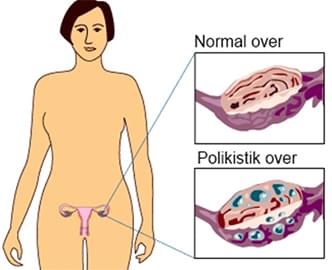
What is Polycystic Ovary Syndrome (PCOS)?
Polycystic Ovary Syndrome (PCOS) is a common hormonal disorder that affects women's reproductive health. It usually begins in adolescence and can progress over time. PCOS causes the ovaries to develop many small cysts (follicles), leading to irregular ovulation or lack of ovulation. This condition results in an imbalance of reproductive hormones such as estrogen and progesterone.
Causes of PCOS
The exact cause of PCOS is not fully understood, but several factors are believed to contribute to its development:
-
Insulin Resistance: When the body becomes resistant to insulin, it cannot use glucose effectively. This can cause the ovaries to produce more androgens (male hormones).
-
Genetics: A family history of PCOS increases the likelihood of developing the condition.
-
Chronic Inflammation: Low-grade chronic inflammation in the body may stimulate increased androgen production.
Symptoms
Symptoms of PCOS vary from person to person but may include:
-
Irregular or absent menstrual cycles
-
Excess hair growth (on the face, chin, chest, and back)
-
Acne and oily skin
-
Hair thinning or male-pattern baldness
-
Weight gain and difficulty losing weight
-
Enlarged ovaries or multiple small cysts on the ovaries
-
Difficulty getting pregnant (infertility)
Diagnosis
To diagnose PCOS, healthcare providers typically use:
-
Medical history and physical examination
-
Hormone level tests (androgens, LH, FSH, prolactin, etc.)
-
Ultrasound: To visualize the ovaries and detect cysts
-
Insulin and blood sugar testing
Diagnosis is often based on the Rotterdam criteria, which require at least two of the following three features:
-
Ovulation disorders
-
Elevated androgen levels
-
Polycystic appearance of ovaries on ultrasound
Long-Term Effects of PCOS
PCOS can lead to more than just irregular periods or fertility issues. It may also cause long-term health problems such as:
-
Type 2 diabetes
-
High blood pressure
-
Heart disease
-
High cholesterol
-
Depression and anxiety
-
Increased risk of endometrial (uterine) cancer
Treatment Options
PCOS treatment is tailored to the individual based on whether she wants to become pregnant, the severity of symptoms, and her lifestyle:
-
Lifestyle changes: Healthy eating and regular exercise help with weight management and improve insulin sensitivity.
-
Birth control pills: Regulate the menstrual cycle, reduce acne and excess hair growth.
-
Metformin: Improves insulin resistance and helps balance hormones.
-
Fertility medications: Drugs like Clomiphene or Letrozole can stimulate ovulation.
-
Surgical options: Laparoscopic ovarian drilling may help lower androgen levels and promote ovulation.
What is Family Planning?
Family planning includes services that help individuals determine the number of children they want and the spacing between them. It also plays a vital role in protecting women's health and preventing unintended pregnancies.
Objectives of Family Planning
-
Control the number and timing of pregnancies
-
Protect maternal and child health
-
Prevent sexually transmitted infections
-
Support women in continuing education or career development
Methods Used
-
Natural Methods:
-
Calendar method
-
Basal body temperature and cervical mucus tracking
-
-
Hormonal Methods:
-
Oral contraceptive pills
-
Injections and implants
-
-
Barrier Methods:
-
Condoms
-
Diaphragms
-
-
Intrauterine Devices (IUDs)
-
Permanent Methods:
-
Tubal ligation in women
-
Vasectomy in men
-
-
Emergency Contraception:
-
Morning-after pill
-
Relationship Between PCOS and Family Planning
For women with PCOS, family planning requires more careful and informed decisions because:
-
Ovulation patterns vary among individuals, affecting fertility.
-
Some contraceptive methods may help reduce PCOS symptoms, while others may not be suitable.
-
Hormone levels and general health should be optimized before attempting pregnancy.

